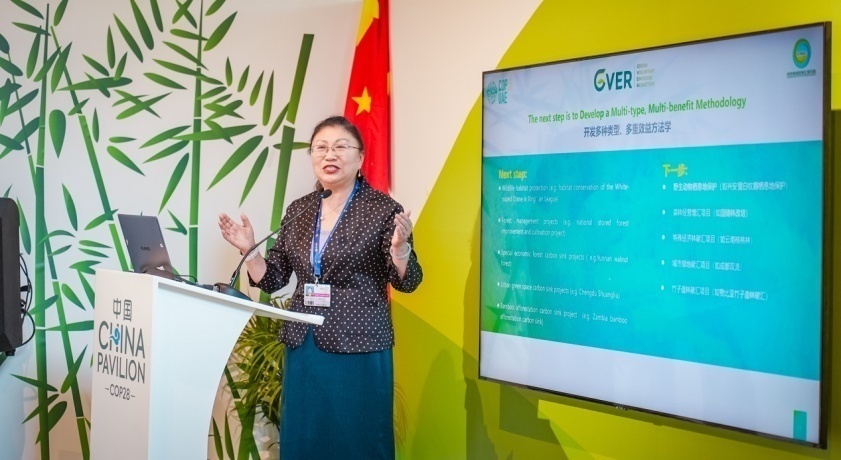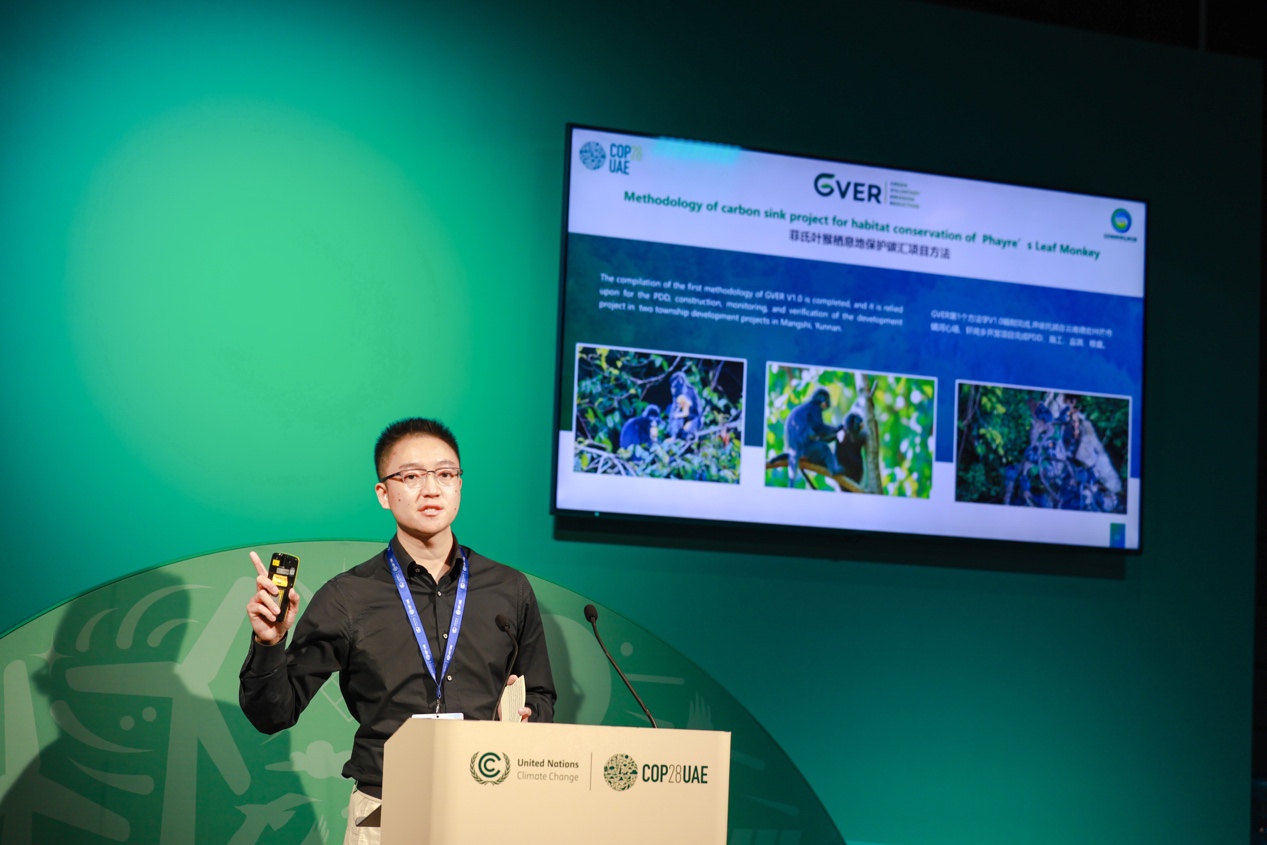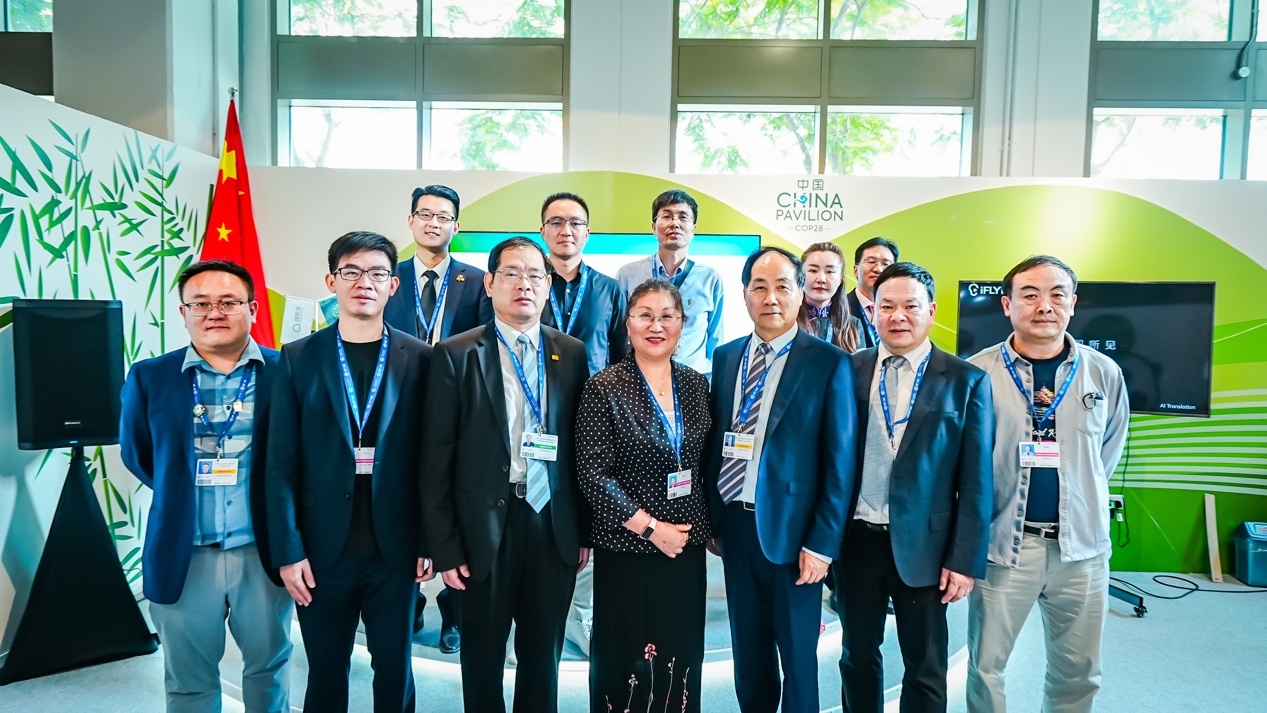The Green Voluntary Carbon Reduction Standard (GVER) was unveiled at COP28
At the 28th Conference of the Parties to the United Nations Framework Convention on Climate Change (hereinafter referred to as COP28) at the China Corner Meeting, the registration platform of China's first independent carbon offset mechanism, the Green Voluntary Emission Reduction (GVER) standard, was officially released. Li Nuyun, president of Zhongguancun Green Carbon Sequestration Research Institute, presided over the launch ceremony.
From November 30 to December 12, 2023,The 28th Conference of the Parties to the United Nations Framework Convention on Climate Change (UNFCCC) was held in Dubai Expo City. During the conference, Li Nuyun delivered three keynote speeches at two China Corner Events, "China-ASEAN Cooperation on Mangrove Ecosystem Conservation" and "Carbon Neutrality, Chinese Enterprises on the Road", and "Green Finance Innovation for Responding to the Dual Crises of Gas-Side and Biosphere-3" at the Paulson Institute and Biosphere 3 Joint Theme Day. This paper reviews the exploration of the synergistic implementation of the United Nations Framework Convention on Climate Change (UNFCCC) and the Convention on Biological Diversity (CBD), shares the research on the innovative methodology of combining carbon credits and biodiversity credits, and introduces the creation process of GVER, a standard system for green voluntary carbon emission reduction. Chen Yuanzhe, Secretary-General of Zhongguancun Green Carbon Sequestration Research Institute, gave a keynote speech on the topic of "Exploration of Biodiversity Conservation Mechanism Based on Carbon Credits" at the COP28 side event, introducing the innovation of the green carbon emission reduction standard system GVER and the first carbon credit project registered in GVER.

Li Nuyun delivered a keynote speech at the COP28 China Corner Meeting.
According to Li Nuyun, terrestrial ecosystems and marine ecosystems dominated by forests have multiple benefits, and carbon sequestration benefits are only one part of them. Although carbon sink trading is one of the effective ways to realize the value of ecological products and promote the transformation of lucid waters and lush mountains into gold and silver mountains, from the perspective of promoting the coordinated implementation of the United Nations Framework Convention on Climate Change (UNFCCC) and the Convention on Biological Diversity (CBD), the combination of quantifiable carbon sinks with the protection of biodiversity that is difficult to quantify and the promotion of farmers' income and sustainable development can be used to voluntarily reduce carbon emissions for enterprises and the public. Carbon neutrality and corporate disclosure of ESG production of high-quality carbon sink products with multiple benefits.
She stressed that although there is a consensus that the price of high-quality carbon credits is at a premium over the price of other types of emission reductions, there is no standard basis for the public to recognize the premium. To this end, it is necessary to create a set of standard systems, not only to combine the two international compliance mechanisms of climate change and biodiversity protection, but also to calculate the value of carbon credits and biodiversity credits, and create a Chinese model for the realization of the value of ecological products.

Chen Yuanzhe delivered a keynote speech at the COP28 side event.
Chen Yuanzhe introduced that the green voluntary emission reduction standard system GVER is a standard system for project development, registration, issuance and cancellation with carbon (sink) labeling with Chinese characteristics and facing the international community to solve the dual goals of carbon neutrality and biodiversity conservation. At present, the first pilot project of the GVER standard system has been registered and can be issued.

GVER registration platform press conference.
Li Nuyun said that the key to the success of the voluntary carbon market lies in the development of a series of scientific and rigorous standards and rules to ensure the high quality of carbon credits and build the confidence of market participants. To this end, the GVER standard system is managed by the GVER Council, which consists of a management committee, an expert committee and an institutional committee, and the daily work is run by the Secretariat (Zhongguancun Green Carbon Sequestration Research Institute). She admits that building an independent carbon offset mechanism is a long and challenging task, and GVER will gradually iterate and improve it in line with international rules. GVER will be committed to providing domestic and foreign enterprises with a set of practical tools to cope with climate change and biodiversity conservation in the voluntary carbon market, helping them to contribute to global sustainable development while achieving carbon neutrality goals.
The birth of China's first independent carbon offset mechanism is an important milestone, marking an important step forward for China in the global voluntary carbon market, and will also contribute to the development of the global voluntary carbon market.







